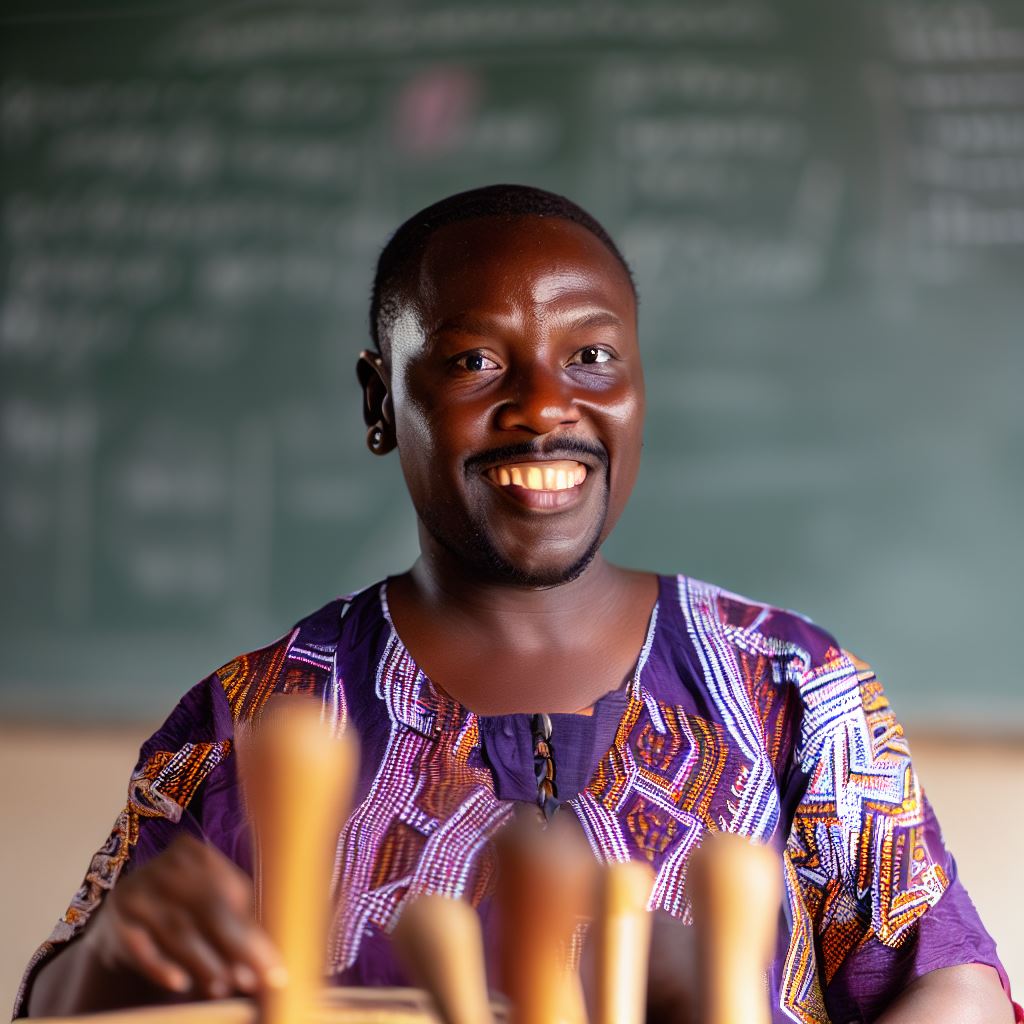Introduction
Let’s explore teaching traditional games: A PE instructor in Nigeria.
In this blog section, we will discuss the topic of teaching traditional games, with a focus on a PE instructor in Nigeria.
Traditional games hold significant cultural value and can promote physical activity among children.
In Nigeria, a PE instructor plays a vital role in introducing and teaching these games to students.
These instructors are responsible for preserving cultural heritage while encouraging physical fitness and teamwork.
By incorporating traditional games into the physical education curriculum, instructors can instill a sense of pride and appreciation for Nigerian traditions.
This not only benefits the students but also helps to preserve and pass on cultural knowledge to future generations.
Additionally, teaching traditional games can foster inclusivity and enhance social skills as students learn to play together, irrespective of their background or physical abilities.
The PE instructor’s role goes beyond teaching the rules and mechanics of the games.
They also act as facilitators, encouraging active participation, fair play, and a sense of sportsmanship.
By incorporating traditional games into their teaching methods,
PE instructors promote physical fitness, cultural preservation, and personal development among Nigerian students.
Background of Traditional Games in Nigeria
Traditional games have a long history in Nigeria, deeply rooted in the country’s rich cultural heritage.
These games are not only a source of entertainment but also hold significant cultural value.
In Nigeria, traditional games encompass a wide variety of activities, including board games, ball games, and outdoor games.
These games have been played for generations, being passed down from parents to children.
One of the most popular traditional games in Nigeria is “ayo,” also known as mancala.
Ayo is a strategic board game played with seeds or stones and a wooden board.
It is not only a game of skill but also a way to foster social interaction and develop critical thinking abilities.
Another traditional game widely played in Nigeria is “ludo.” This board game involves rolling a dice and racing your tokens to reach the finish line.
Ludo not only provides entertainment but also teaches valuable skills such as counting, patience, and sportsmanship.
Aside from board games, ball games like “ayo olopon” and “kokowa” are also prevalent in Nigeria.
Ayo olopon is a game played with marbles, where players try to knock their opponent’s marbles out of a designated area.
Kokowa, on the other hand, is a game similar to dodgeball, with players trying to hit their opponents with a ball without getting hit themselves.
A. Importance and cultural significance of traditional games
These traditional games hold cultural significance as they often have historical and mythical influences.
They are a way for Nigerians to connect with their ancestors, preserve their traditions, and showcase their cultural identity.
Moreover, traditional games provide an avenue for socialization and community bonding.
They bring people together, fostering a sense of unity and camaraderie.
These games are often played during festivals, ceremonies, and community gatherings, creating a shared experience and strengthening social ties.
Furthermore, traditional games contribute to the physical and mental development of individuals.
They promote physical fitness, coordination, and motor skills as players engage in physical activities.
These games also enhance cognitive abilities such as problem-solving, strategic thinking, and decision-making.
B. How these games have been passed down through generations
The passing down of traditional games in Nigeria is primarily through oral tradition and observation.
Parents and elders teach the games to the younger generation, passing on the rules, strategies, and cultural significance.
These games are often learned through hands-on experience, playing alongside family members and community members.
In recent years, however, there has been a decline in the popularity of traditional games due to the influence of modern technology and Western cultures.
Children and young adults are increasingly drawn to video games, smartphones, and other electronic devices, neglecting the traditional games of their ancestors.
To ensure the preservation of traditional games, physical education (PE) instructors play a crucial role.
PE instructors can incorporate traditional games into school curricula, organizing workshops and events to introduce students to these games.
This will not only educate the younger generation about their cultural heritage but also revive interest in and appreciation for traditional games.
In fact, traditional games in Nigeria have a deep-rooted history and cultural significance.
They provide entertainment, promote socialization, enhance physical and mental development, and serve as a link to Nigeria’s cultural identity.
The passing down of these games through generations is essential to preserve the country’s rich heritage.
PE instructors have a responsibility to educate and promote traditional games among the younger generation, ensuring their continuity for years to come.
Read: Physical Education Policies in Nigeria: A Deep Dive
Challenges Faced by Modern PE Instructors
Physical Education (PE) instructors face numerous challenges in today’s modern world.
These challenges are further exacerbated in a country like Nigeria, where the emphasis on traditional games is gradually diminishing.
- Limited resources and facilities make it difficult for instructors to provide a comprehensive PE program.
- Overcrowded classrooms and lack of sufficient equipment hinder effective instruction.
- Modernization and technology have shifted the focus away from traditional games.
- Traditional games are not given adequate attention or space in the current PE curricula.
- Many students and parents prioritize academics over physical education, leading to a lack of interest.
- The increasing influence of western sports and activities has marginalised traditional games.
- Socio-economic factors limit students’ access to sports facilities and prevent participation in physical activities.
- Insufficient training and professional development opportunities for PE instructors contribute to their challenges.
- Limited awareness and understanding of the importance of physical education among stakeholders.
- Inadequate government funding for PE programs leads to a lack of resources and support.
A. Challenges Faced by PE Instructors in Nigeria
In Nigeria, PE instructors encounter additional challenges specific to their country’s context.
These challenges include:
- Cultural bias towards western sports, pushing aside traditional games.
- Insufficient inclusion of traditional games in the national curriculum.
- Lack of awareness among students about the cultural significance of traditional games.
- Limited exposure to traditional games due to urbanization and migration to cities.
- Traditional games not receiving adequate recognition and support from the government.
- Urban lifestyle changes and modernization leading to a decline in physical activity.
- High prevalence of sedentary behavior among children, contributing to health issues.
- Language barriers preventing effective communication between instructors and students.
- Inadequate training and certification opportunities for PE instructors in traditional games.
- Limited research and documentation on traditional games, hindering their promotion and preservation.
B. Lack of Emphasis on Traditional Games in Current Curricula
In the current curricula, there exists a noticeable lack of emphasis on traditional games across educational institutions in Nigeria.
This neglect is causing traditional games to fade away and be forgotten.
- Modern educational institutions prioritize academic subjects, often neglecting physical education.
- Traditional games are not considered a formal part of the curriculum, leading to their exclusion.
- Limited time allocated to physical education classes decreases the opportunity for teaching traditional games.
- Western sports and activities overshadow traditional games, leading to their marginalization.
- Lack of training and resources for instructors to effectively incorporate traditional games into the curriculum.
- Outdated perceptions of traditional games as less valuable or inferior to modern sports.
- Teachers’ unfamiliarity with traditional games leads to a lack of confidence in teaching them.
- Limited assessment and evaluation tools for traditional games hinder their integration into formal education.
- Lack of standardized guidelines for teaching traditional games creates inconsistency in instruction.
- Insufficient research and publications on the educational benefits of traditional games.
C. Impact of Technology and Modernization on Traditional Games
Technology and modernization have deeply impacted traditional games, contributing to their decline in popularity and practice.
- The rise of electronic entertainment has decreased interest in physical activities, including traditional games.
- Urbanization and modern lifestyles have led to a shift in leisure preferences away from traditional games.
- Access to smartphones, gaming consoles, and the internet distracts children from engaging in physical play.
- Traditional games require open spaces, which are becoming scarce due to urban development.
- Globalization has introduced western sports and activities, overshadowing traditional games.
- Lack of exposure to traditional games due to migration to cities and disconnect from rural traditions.
- Cultural erosion and loss of appreciation for indigenous practices contribute to neglecting traditional games.
- Modernization has led to a sedentary lifestyle, resulting in the decline of physical activity in general.
- Limited integration of technology into teaching traditional games prevents their adaptation for the digital age.
- Efforts should be made to strike a balance between technology and preserving traditional games.
In short, modern PE instructors face numerous challenges, especially in Nigeria, where traditional games receive insufficient emphasis in current curricula.
The impact of technology and modernization further exacerbate the neglect faced by these games.
It is crucial for educators, policymakers, and society as a whole to recognize the value of traditional games and take proactive steps to reintegrate them into physical education.
Read: Training Tips from Assistant Athletic Trainers in Nigeria
Benefits of Teaching Traditional Games
Teaching traditional games in physical education (PE) classes offers numerous benefits for students.
These games not only provide physical exercise but also enhance cognitive and social skills.
Moreover, they promote cultural preservation and appreciation among students while fostering inclusivity and cooperation.
A. Physical Benefits
- Improves overall fitness levels.
- Enhances motor skills and coordination.
- Increases cardiovascular endurance.
- Boosts muscle strength and flexibility.
B. Cognitive Benefits
- Develops problem-solving and critical thinking abilities.
- Enhances decision-making skills.
- Improves concentration and focus.
- Enhances spatial awareness and judgment.
C. Social Benefits
- Promotes teamwork and cooperation.
- Enhances communication and leadership skills.
- Fosters a sense of belonging and camaraderie among students.
- Builds trust and respect for others.
D. Cultural Preservation and Appreciation
Traditional games have deep roots in a society’s culture and history.
By teaching these games, PE instructors can promote cultural preservation and appreciation among students.
It provides an opportunity for students to learn about their heritage, traditions, and values.
This helps in keeping the cultural identity alive and creating a sense of pride in their roots.
E. Potential for Inclusivity and Cooperation
Traditional games often involve a diverse range of skills and abilities, allowing students of all levels to participate.
These games create an inclusive environment where every student can feel valued and contribute to the team’s success.
Moreover, traditional games require cooperation and teamwork, encouraging students to work together towards a common goal.
This develops their social skills and teaches them the importance of supporting and respecting one another.
In essence, teaching traditional games in PE classes offers several benefits.
These games provide physical, cognitive, and social benefits, while promoting cultural preservation and appreciation.
Furthermore, they create an inclusive and cooperative environment among students, fostering positive social interaction and skill development.
Incorporating traditional games into the curriculum enables students to embrace their heritage, stay active, and develop essential life skills.
Read: An Overview: Assistant Athletic Trainer Career in Nigeria

Strategies for Teaching Traditional Games
Teaching traditional games can be an exciting and enriching experience for both the students and the PE instructor.
Here are some strategies to make the teaching process effective:
- Start by researching and understanding the cultural significance of different traditional games.
- Introduce the games in a fun and interactive way, capturing students’ interest and curiosity.
- Break down the rules and mechanics of each game, ensuring clarity and comprehension.
- Consider using visual aids, such as diagrams or videos, to demonstrate how the games are played.
- Provide ample opportunities for hands-on practice, allowing students to actively participate and learn through experience.
- Encourage teamwork and collaboration, as traditional games often involve group dynamics and cooperation.
- Incorporate modifications or adaptations to suit the age, skill level, and abilities of the students.
- Facilitate discussions about the historical and cultural context of the games, promoting a deeper understanding.
- Offer continuous feedback and guidance to students, focusing on their strengths and areas for improvement.
- Organize friendly competitions or tournaments, fostering a sense of healthy competition and sportsmanship.
A. Tips and Techniques for Introducing Traditional Games to Students
Introducing traditional games to students requires careful planning and consideration.
Here are some tips and techniques:
- Start with a brief introduction, highlighting the cultural heritage and significance of the traditional games.
- Create a supportive and inclusive learning environment, where students feel safe to try new activities.
- Use storytelling or anecdotes to engage students and generate curiosity about the games.
- Break down complex games into smaller, manageable parts, gradually building up to the full gameplay.
- Encourage active participation by assigning roles or responsibilities within the games.
- Provide clear instructions and rules, ensuring students understand the objectives and how to play.
- Incorporate warm-up exercises or stretches related to the specific games, preparing students physically.
- Allow for flexibility and creativity, encouraging students to modify or adapt the games to their preferences.
- Explain the benefits of playing traditional games, such as improving physical fitness, cognitive skills, and social interactions.
- Celebrate and acknowledge students’ efforts and achievements, fostering a sense of accomplishment and motivation.
B. The Importance of Creating a Safe and Inclusive Learning Environment
Creating a safe and inclusive learning environment is crucial when teaching traditional games.
Here’s why:
- It promotes a sense of belonging and acceptance, regardless of students’ backgrounds or abilities.
- Students feel confident to participate and express themselves freely, without fear of judgment or exclusion.
- It encourages teamwork and cooperation, as students understand the value of collective effort.
- A safe environment fosters respect and empathy, promoting positive social interactions among students.
- Students are more willing to take risks and explore new activities when they feel supported and valued.
C. Ideas for Incorporating Traditional Games into Lesson Plans
Incorporating traditional games into lesson plans can enrich the learning experience.
Here are some ideas:
- Use traditional games as a warm-up activity at the beginning of each class.
- Design lesson plans around specific traditional games, integrating related skills and concepts.
- Organize cultural exchange activities, where students learn traditional games from different countries.
- Create cross-curricular connections by incorporating history, geography, or cultural studies alongside the games.
- Invite community members or elders to share their experiences and knowledge of traditional games.
- Encourage students to research and present on the cultural significance of various traditional games.
- Organize a traditional games fair or exhibition, showcasing different games and their origins.
- Allow time for reflection and discussion after playing traditional games, encouraging students to analyze their experiences.
- Collaborate with other subject teachers to explore connections between traditional games and other areas of study.
- Offer opportunities for students to create their own traditional games, fostering creativity and innovation.
Teaching traditional games not only preserves cultural heritage but also promotes physical activity, teamwork, and a deeper understanding of different cultures.
By incorporating strategies, tips, and techniques, and creating a safe and inclusive learning environment, PE instructors in Nigeria can successfully introduce traditional games to their students.
Read: Success Stories: Famous Nigerian Sports Information Directors
Success Stories and Case Studies
In Nigeria, PE instructors have achieved remarkable success in teaching traditional games.
These success stories serve as inspiration and motivation for others in the field.
A. Examples of PE instructors in Nigeria successfully teaching traditional games
One such success story is that of Mr. Adeolu, a PE instructor at a secondary school in Lagos.
He introduced traditional games to his students as a way to promote cultural awareness and physical fitness.
With his enthusiastic approach and engaging teaching methods, he was able to capture the students’ interest and create a positive learning environment.
Through his efforts, Mr. Adeolu witnessed a significant increase in his students’ participation and enjoyment of physical education classes.
He observed how traditional games allowed students to bond with each other and develop a sense of teamwork.
Furthermore, these games sparked their curiosity about their own culture and heritage.
Another PE instructor, Mrs. Onyeka, focused on teaching traditional dance forms to her students.
She recognized the importance of cultural preservation and wanted to expose her students to their rich cultural heritage.
Through dance, she encouraged self-expression and creativity while fostering an appreciation for traditional values.
Mrs. Onyeka’s efforts were met with overwhelming positivity from both the students and their parents.
Many students reported feeling a strong sense of pride in their heritage and an increased understanding of their cultural identity.
Parents praised Mrs. Onyeka for her innovative teaching methods and were impressed by the positive changes they saw in their children.
B. Anecdotes and Testimonials
The impact of teaching traditional games in PE classes goes beyond the surface level.
It affects the overall well-being of students, both physically and emotionally.
Several anecdotes and testimonials highlight the transformative power of these activities.
One student, Ahmed, shared his experience of learning traditional wrestling.
He initially struggled with self-confidence and had low physical stamina. However, through the guidance of his PE instructor, Ahmed gradually improved his fitness and gained self-belief.
He won his first wrestling match, boosting his self-esteem and motivating him to continue his physical education journey.
A testimonial from Mrs. Mohammed, a parent, emphasized the positive impact of traditional games on her daughter’s overall well-being.
Her daughter, Fatima, used to be shy and reserved.
However, after actively participating in traditional games and sports, Fatima became more outgoing and confident.
She also developed a stronger connection to her Nigerian culture.
C. Positive Impact on Well-being and Cultural Awareness
Teaching traditional games in PE classes not only enhances students’ physical fitness but also promotes their well-being and cultural awareness.
Students engage in activities that connect them to their cultural roots while fostering a sense of community and teamwork.
By actively participating in these games, students acquire valuable life skills such as problem-solving, communication, and leadership.
They develop resilience, learn how to set and achieve goals, and become more adaptable to different situations.
Furthermore, the positive impact on students’ cultural awareness cannot be overstated.
Traditional games provide a platform for students to explore their heritage, understand the significance of rituals and traditions, and appreciate the diversity within their own country.
In a nutshell, the success stories, anecdotes, and testimonials from PE instructors and students in Nigeria serve as compelling evidence of the benefits of teaching traditional games.
These activities not only improve students’ physical fitness but also enhance their overall well-being and cultural awareness.
PE instructors play a crucial role in promoting these traditional games, fostering a sense of pride, and building a stronger connection to Nigerian heritage among students.
Conclusion
Teaching traditional games in PE classes is incredibly important.
These games provide students with a valuable connection to their cultural heritage, fostering pride and understanding.
PE instructors play a crucial role in preserving these traditions and passing them down to future generations.
By incorporating traditional games into their teaching practices, instructors can provide a unique and engaging experience for their students.
It is our responsibility as educators to encourage exploration and appreciation of these games, ensuring that they continue to be cherished and celebrated.
Let us embrace the richness and diversity of traditional games and make them a vibrant part of our PE classes.
Together, we can preserve our cultural heritage and inspire our students with the joy and value of these time-honored games.




